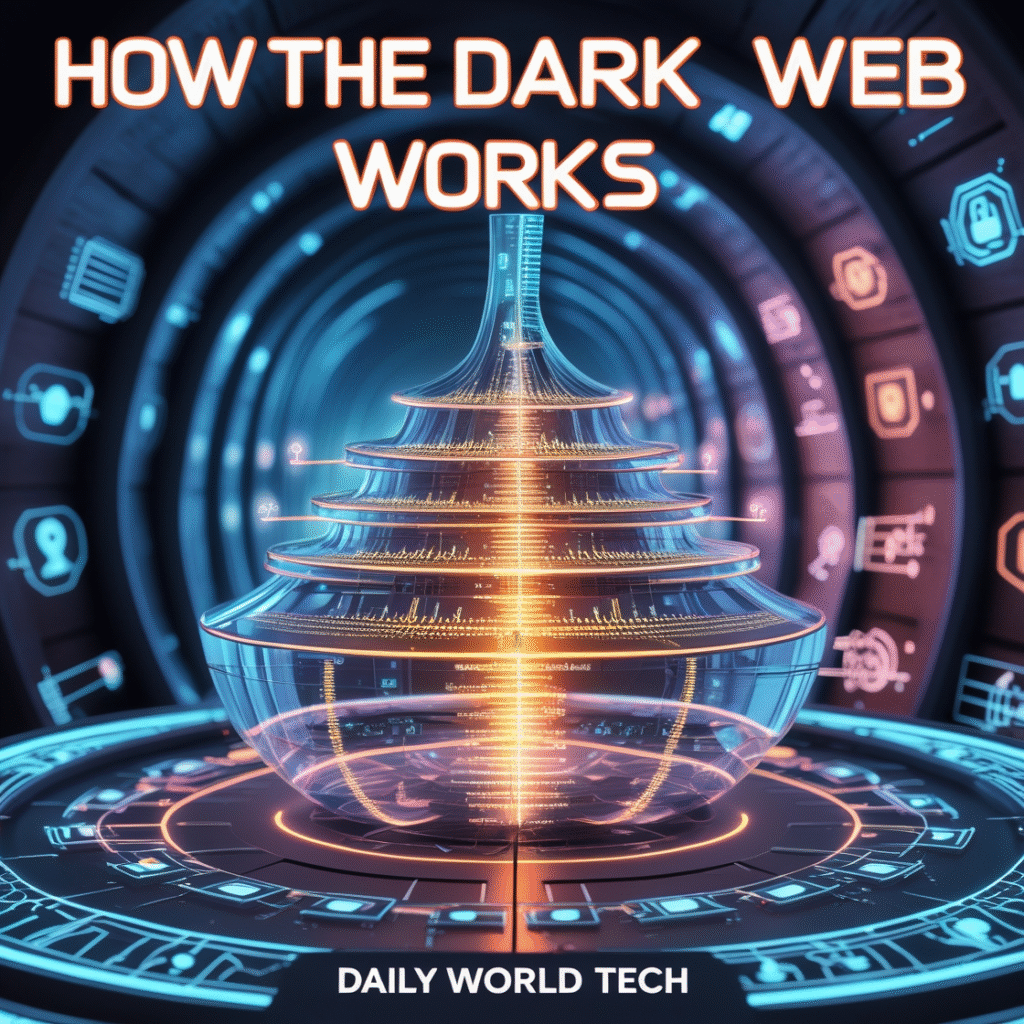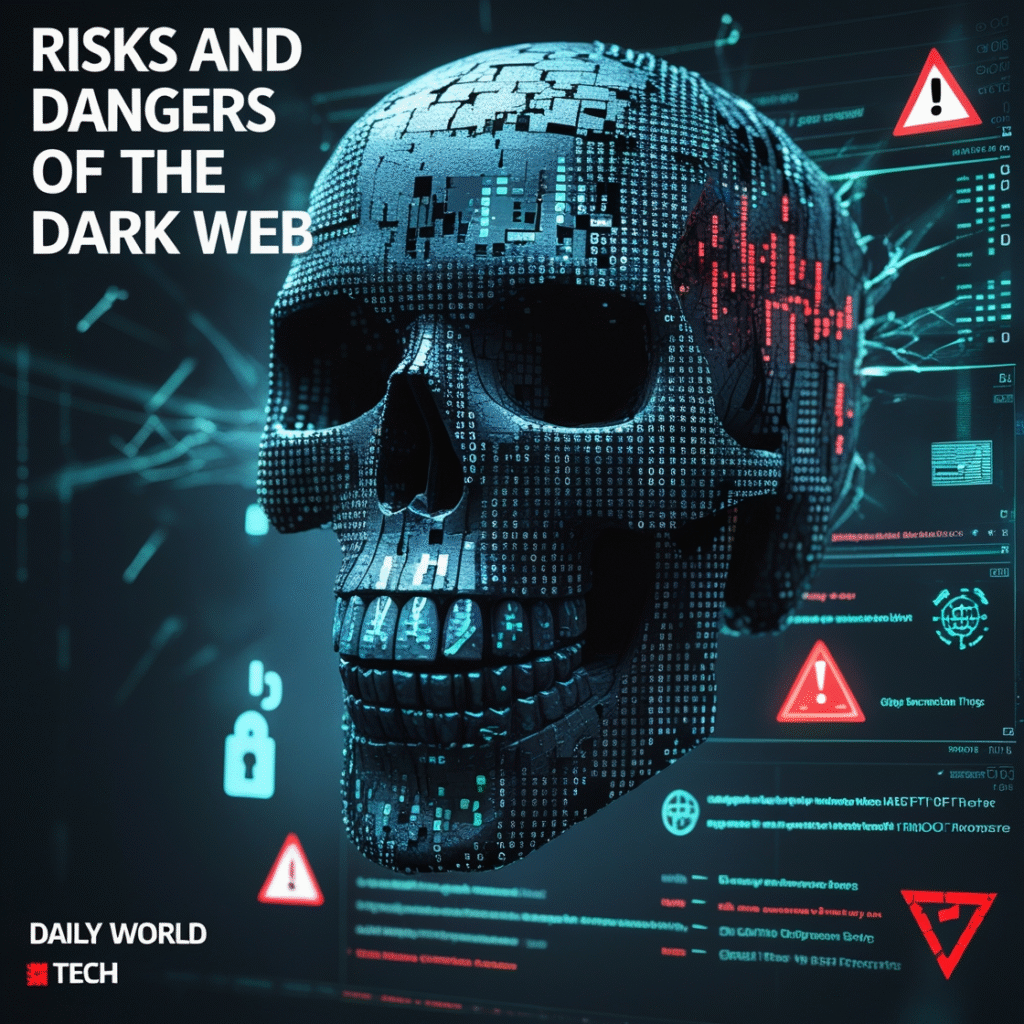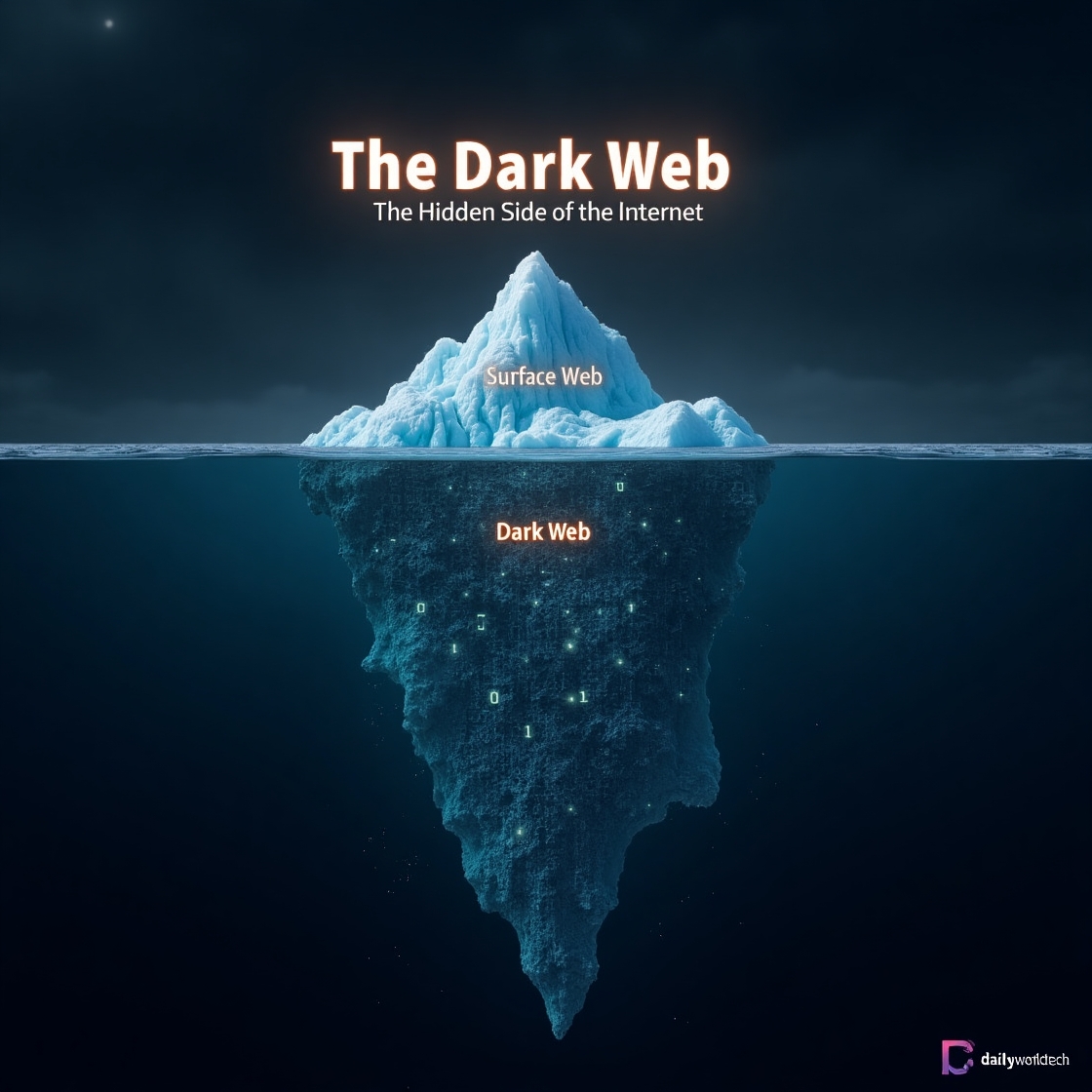The internet, as we know it, is just the tip of the iceberg. Beneath the surface lies a vast, mysterious digital landscape that remains largely hidden from the average user. This concealed layer is known as the dark web—a term that evokes curiosity, fear, and fascination all at once. But what exactly is the dark web? Why does it exist? Who uses it, and how? In this in-depth blog, we’ll explore every facet of the dark web, from its architecture to its dangers and its legitimate uses.

1. What is the Dark Web?
The dark web is an encrypted part of the internet that cannot be accessed through regular browsers. It operates on overlay networks—primarily Tor—which anonymize the user’s identity and location through complex layers of encryption.
Key Features:
- Uses .onion domain extensions.
- Focus on anonymity and non-traceability.
- Often used for whistleblowing, journalism, private communications, and illicit activities.
2. Understanding the Layers of the Internet
The internet is divided into three major layers:
Surface Web
- The part of the internet accessible to the general public through traditional browsers like Chrome, Firefox, or Safari.
- Websites indexed by search engines such as Google, Bing, or Yahoo.
- Examples: Facebook, YouTube, news websites, blogs.
Deep Web
- Content not indexed by search engines.
- Includes academic databases, financial records, intranets, password-protected services, and medical data.
- Legal and often used by organizations and individuals for privacy.
Dark Web
- A small portion of the deep web that is intentionally hidden and inaccessible via standard web browsers.
- Requires special tools like the Tor browser or I2P (Invisible Internet Project) to access.
- Known for hosting both legitimate privacy-focused content and illegal black market activities.

3. How Does the Dark Web Work?
At the heart of the dark web is Tor (The Onion Router), a decentralized network developed to enable private communication.
How Tor Works:
- When a user sends data through the Tor browser, it is encrypted and sent through multiple random nodes (relays).
- Each node decrypts a single layer, revealing the next destination.
- The final destination cannot trace back the origin due to multi-layered encryption, like an onion.
Other Tools:
- I2P: Used for anonymous file sharing and messaging.
- Freenet: A peer-to-peer platform for censorship-resistant communication.
4. What Can You Find on the Dark Web?
Contrary to popular belief, not everything on the dark web is illegal. Here’s a breakdown:
Legitimate Uses:
- Whistleblowing Platforms (e.g., SecureDrop, WikiLeaks)
- Private Communication (journalists, human rights activists)
- Research (security analysts monitoring cyber threats)
- Anonymous Blogging & Forums
Illegal Uses:
- Black Markets (drugs, weapons, fake passports)
- Stolen Data (credit card numbers, identity info)
- Hacking Services (DDoS attacks, exploits, ransomware)
- Illegal Pornography & Human Trafficking
- Fake Currency & Counterfeit Goods
5. Notorious Dark Web Marketplaces
Dark web marketplaces operate like eBay or Amazon—but for illegal products. Many have been shut down, but new ones constantly emerge.
Famous Cases:
- Silk Road: One of the first large-scale darknet markets, shut down in 2013. Its founder, Ross Ulbricht, was sentenced to life in prison.
- AlphaBay: Became a successor to Silk Road; shut down in 2017 by global law enforcement.
- Hydra: A Russian-based market, shut down in 2022 by German and U.S. officials.
- DarkMarket: Claimed to be the largest illegal marketplace at its time of operation.
These markets often deal in cryptocurrencies like Bitcoin and Monero to maintain anonymity.
6. Who Uses the Dark Web and Why?
The user base of the dark web is diverse, and motivations vary widely.
1. Whistleblowers
- Use the dark web to leak sensitive government or corporate information.
- Helps protect their identities.
2. Journalists
- Use Tor to communicate with sources safely and anonymously.
- Platforms like ProPublica operate Tor-based mirror sites.
3. Activists and Dissidents
- In authoritarian regimes, individuals use the dark web to bypass censorship.
- Protects against surveillance.
4. Cybercriminals
- Conduct illegal trade or offer malicious services like ransomware-as-a-service.
- Buy and sell exploits, personal data, and access credentials.
5. Everyday Users
- Some use it out of curiosity or to access forums and websites that don’t track data or usage patterns.
7. Is It Legal to Access the Dark Web?
Yes, accessing the dark web is not illegal in most countries. However, what you do there can cross legal boundaries quickly.
Legal Activities:
- Accessing SecureDrop or Tor-based journalistic platforms.
- Reading blogs or using encrypted communication tools.
Illegal Activities:
- Buying or selling illicit goods.
- Accessing child pornography or abusive material.
- Hiring hitmen or hackers.
- Participating in fraud or scams.
Many countries, including the United States and EU members, actively monitor and prosecute illegal activity stemming from dark web use.
8. How to Access the Dark Web Safely
If you’re considering accessing the dark web for research, privacy, or ethical reasons, follow these safety tips:
✅ Use a Reputable VPN
- Before opening Tor, run a VPN to hide your IP address from your ISP.
✅ Install the Official Tor Browser
- Only download from the official Tor Project website.
✅ Disable JavaScript
- Many exploits target browser vulnerabilities.
✅ Avoid Logging into Personal Accounts
- Never use real names or credentials.
✅ Do Not Download Files
- Avoid executable files, PDFs, or any downloadable content from untrusted sources.
✅ Use Cryptocurrency Cautiously
- Cryptocurrency wallets can be traced. Use mixers or privacy-focused coins like Monero.

9. Risks of the Dark Web
Accessing the dark web carries inherent dangers, even for ethical users.
⚠️ Scams and Frauds
- Many marketplaces are honeypots or scams that steal your money or data.
⚠️ Malware Infections
- Clicking on the wrong link could result in downloading ransomware, spyware, or Trojans.
⚠️ Surveillance
- Intelligence agencies monitor Tor traffic patterns.
- One mistake can expose your real identity.
⚠️ Psychological Impact
- Unfiltered content such as abuse, gore, or criminal activity can be deeply disturbing.
10. Myths vs. Reality
| Myth | Reality |
| All users are criminals | Many use it for privacy, journalism, or activism |
| It’s impossible to track users | Law enforcement can trace activities using digital forensics |
| You can buy anything easily | Most sellers are scammers; many markets are fakes |
| The dark web is massive | It’s much smaller than the deep web and surface web |
| Only tech experts can use it | Anyone can use Tor, but safety requires knowledge |
11. Famous Cases Related to the Dark Web
🔍 Ross Ulbricht (Silk Road)
- Arrested in 2013.
- Charges included conspiracy to traffic narcotics and money laundering.
- Sentenced to life imprisonment without parole.
🔒 Operation Disruptor (2020)
- A joint effort by global agencies (FBI, Europol) targeting dark web vendors.
- Resulted in 170+ arrests and the seizure of $6.5M in crypto and 500+ kg of drugs.
🕵️♂️ Playpen Case
- FBI seized a child pornography site and ran it on its own server to identify users.
- Sparked debate about law enforcement methods on the dark web.
12. The Future of the Dark Web
The dark web continues to evolve with emerging technologies.
1. Rise of Decentralized Web
- Platforms built on blockchain technology may offer even more privacy.
2. Enhanced Surveillance
- Governments are developing AI-driven tools to track illegal activity more effectively.
3. Shift to Privacy Coins
- Cryptocurrencies like Monero, Zcash, and Dash are growing in use for anonymous transactions.
4. Increase in Political Usage
- As censorship grows worldwide, activists and journalists turn to dark web solutions.
13. Ethical Questions Around the Dark Web
The dark web sits at the intersection of privacy rights and security concerns.
Arguments for Privacy:
- Protects whistleblowers, minorities, and political dissidents.
- Fights against surveillance capitalism.
Arguments Against:
- Facilitates human trafficking, drug trade, and cyberterrorism.
- Encourages criminal anonymity.
The key challenge for society is to balance freedom and accountability in the digital world.
Conclusion
The dark web is not just a digital underworld—it’s a complex ecosystem of human behaviour, innovation, crime, and resistance. For some, it’s a haven for privacy and free speech. For others, it’s a criminal marketplace with global implications.
By understanding the structure, risks, and real-world impact of the dark web, we can make informed choices about our own digital footprints and advocate for responsible internet policies. Whether you’re a journalist, technologist, or just a curious citizen, the dark web serves as a reminder: the internet is far deeper—and more complicated—than it appears on the surface.















